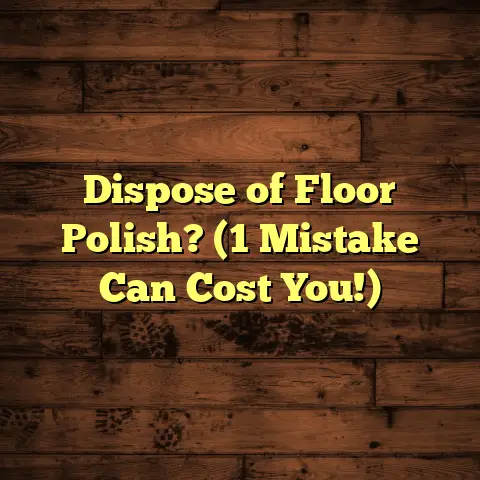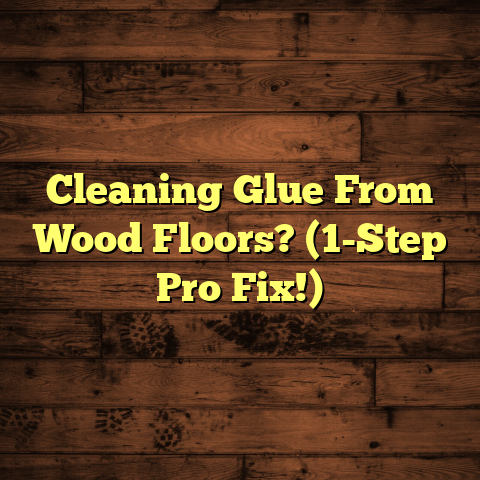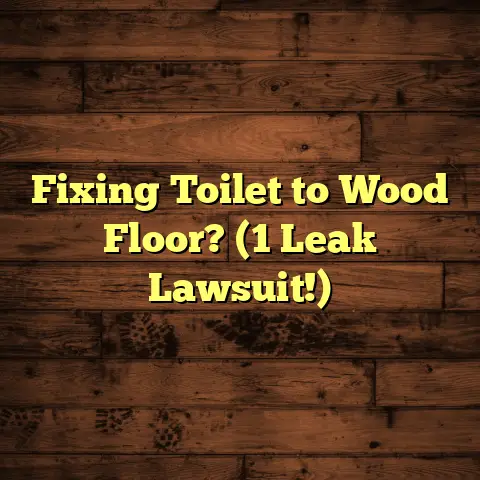What Is Best Product To Clean Hardwood Floors?
Hardwood Floors: Discovering the Best Products for a Sparkling Shine
I’m excited to dive into a topic near and dear to my heart: keeping those gorgeous hardwood floors spick-and-span.In today’s world, we’re all becoming more aware of what we’re bringing into our homes. Think about it: we’re constantly bombarded with information about the chemicals in our everyday products.
That’s why I’m seeing a huge trend toward eco-friendly and sustainable cleaning solutions. People want products that are safe for their families, their pets, and the planet. And guess what? You don’t have to sacrifice effectiveness to go green!
We’re also seeing a rise in multi-purpose cleaners that can tackle a variety of surfaces while still being gentle on hardwood. It’s all about finding that sweet spot between convenience and conscience.
Choosing the right cleaning product is essential to maintaining the beauty and longevity of your hardwood floors. Trust me, I’ve seen it all in my years as a flooring contractor. So, let’s get started!
Section 1: Understanding
Hardwood Floors
Okay, first things first: let’s talk about what exactly we’re dealing with. Not all hardwood floors are created equal.
There are two main types: solid hardwood and engineered hardwood.
-
Solid Hardwood: Think classic, timeless beauty. These floors are made from a single piece of wood, typically ¾ inch thick. They can be sanded and refinished multiple times, giving them incredible longevity.
-
Engineered Hardwood: This is where modern technology meets natural beauty. Engineered hardwood consists of a thin layer of hardwood veneer bonded to a core of plywood or high-density fiberboard (HDF). It’s more dimensionally stable than solid hardwood, meaning it’s less prone to warping or cupping in humid environments.
Why does this matter when it comes to cleaning? Well, different types of hardwood floors can react differently to cleaning products. Solid hardwood, with its thicker construction, can generally withstand more aggressive cleaning methods.
Engineered hardwood, on the other hand, requires a gentler touch to protect the veneer layer.
Proper maintenance and cleaning are key to preserving the finish and durability of your hardwood floors. Think of it like taking care of a fine piece of furniture – you want to protect your investment!
But let’s be real: cleaning hardwood floors isn’t always a walk in the park. Homeowners often face a few common challenges:
-
Scratches: These can be caused by pets, furniture, or even just everyday foot traffic.
-
Stains: Spills happen! Whether it’s red wine, coffee, or pet accidents, stains can be a real pain to remove.
-
Water Damage: This is probably the biggest fear for hardwood floor owners. Water can cause warping, cupping, and even mold growth.
I can’t stress enough the importance of addressing these challenges promptly and correctly. Using the wrong cleaning product or technique can actually make the problem worse!
Section 2: The Science of
Cleaning Products
Alright, let’s get a little nerdy for a minute and talk about the science behind cleaning products. Understanding how these products work can help you make informed decisions about what to use on your hardwood floors.
At its core, cleaning is all about removing dirt, grime, and other unwanted substances from a surface. Cleaning products achieve this through a variety of mechanisms, often involving:
-
Surfactants: These are the workhorses of cleaning products. They reduce the surface tension of water, allowing it to spread more easily and penetrate dirt and grime. Surfactants also have a dual nature: one end attracts water (hydrophilic), while the other end attracts oil and grease (hydrophobic). This allows them to emulsify dirt and grease, lifting them away from the surface so they can be rinsed away.
-
Enzymes: These are biological catalysts that break down complex molecules into smaller, more manageable pieces. Enzymes are particularly effective at removing organic stains, such as food spills, pet accidents, and blood.
-
pH Levels: pH is a measure of how acidic or alkaline a substance is. The pH scale ranges from 0 to 14, with 7 being neutral. Acidic cleaners (pH less than 7) are good at removing mineral deposits and soap scum, while alkaline cleaners (pH greater than 7) are better at dissolving grease and oil.
Now, let’s talk about the different types of cleaning agents you’ll find on the market:
-
Natural Cleaners: These are typically made from plant-based ingredients and are free from harsh chemicals, synthetic fragrances, and artificial colors. Common ingredients include vinegar, baking soda, citric acid, and essential oils.
-
Chemical-Based Cleaners: These contain synthetic chemicals that are designed to remove dirt and grime quickly and effectively. Common ingredients include ammonia, bleach, and solvents.
-
Multi-Surface Cleaners: These are designed to be used on a variety of surfaces, including hardwood floors, tile, and laminate. They often contain a blend of surfactants and solvents that can remove a wide range of dirt and grime.
So, what’s the deal with pH balance and hardwood finishes? Well, hardwood finishes are typically either water-based or oil-based. Water-based finishes are more sensitive to acidic cleaners, while oil-based finishes can be damaged by alkaline cleaners.
That’s why it’s important to choose a cleaning product with a neutral pH (around 7) to avoid damaging your hardwood finish.
Section 3: Evaluating Cleaning
Products
Okay, now that we’ve covered the science behind cleaning products, let’s talk about how to evaluate them. With so many options on the market, it can be tough to know where to start.
I’ve developed a detailed criterion for evaluating cleaning products for hardwood floors, focusing on three key areas:
-
Effectiveness: Does the product actually clean your floors? Does it remove dirt, grime, and stains without leaving behind a residue?
-
Safety: Is the product safe for your family, your pets, and your hardwood floors? Does it contain any harsh chemicals that could cause irritation or damage?
-
Environmental Impact: Is the product eco-friendly and sustainable? Is it made from renewable resources? Is it biodegradable?
Here are some key features to look for in a hardwood floor cleaner:
-
Non-Toxic Ingredients: Look for products that are free from harsh chemicals, synthetic fragrances, and artificial colors.
-
Compatibility with Finishes: Make sure the product is specifically designed for hardwood floors and is compatible with your type of finish (water-based or oil-based).
-
Ease of Use: Choose a product that is easy to apply and remove. Nobody wants to spend hours scrubbing their floors!
I also want to touch on labeling and certification standards. These can be helpful guides when you’re trying to choose a safe and effective cleaning product.
Two of the most common certifications are:
-
EPA Safer Choice: This program identifies products that meet strict criteria for human health and environmental safety.
-
Green Seal: This independent non-profit organization certifies products that meet rigorous environmental and performance standards.
Section 4: Top Products for
Cleaning Hardwood Floors
Alright, let’s get to the good stuff! After years of experience and countless hours of research, I’ve compiled a list of the best products available on the market for cleaning hardwood floors.
I’ve categorized them into three main groups: commercial cleaners, DIY solutions, and eco-friendly choices.
Commercial Cleaners
These are the ready-to-use products you can find at your local grocery store or home improvement center. They’re convenient and often very effective, but it’s important to choose wisely.
Here are a few of my top picks:
-
Bona Hardwood Floor Cleaner: This is a classic choice that’s been around for years. It’s a water-based formula that’s pH-neutral and safe for all types of hardwood finishes. It’s also Greenguard Gold certified, meaning it meets strict standards for chemical emissions.
- Ingredients: Water, surfactants, chelating agents, and preservatives.
- Benefits: Effective at removing dirt and grime, dries quickly, and leaves no residue.
- Drawbacks: Some users find the scent to be a bit strong.
- User Testimonial: “I’ve been using Bona for years, and it’s never let me down. My floors always look clean and shiny!” – Sarah M.
-
Murphy Oil Soap: This is another classic choice that’s been around for generations. It’s made from natural ingredients and is safe for all types of hardwood finishes. However, it’s important to dilute it properly to avoid leaving a residue.
- Ingredients: Water, coconut oil, and other plant-based oils.
- Benefits: Gentle on hardwood floors, leaves a pleasant scent, and can also be used on other surfaces.
- Drawbacks: Can leave a residue if not diluted properly, may not be effective on tough stains.
- User Testimonial: “I love the way Murphy Oil Soap makes my floors smell. It’s like a breath of fresh air!” – John B.
-
Rejuvenate Wood Floor Cleaner: This product is designed to not only clean your floors but also restore their shine. It’s a polymer-based formula that fills in micro-scratches and leaves a protective coating.
- Ingredients: Water, acrylic polymers, surfactants, and preservatives.
- Benefits: Cleans and restores shine, protects against scratches, and leaves a durable finish.
- Drawbacks: Can be a bit pricey, may not be suitable for all types of finishes.
- User Testimonial: “Rejuvenate made my old, dull floors look brand new again! I was amazed at the difference.” – Lisa K.
DIY Solutions
For those of you who like to get crafty in the kitchen, here are a few recipes for homemade hardwood floor cleaners:
-
Vinegar and Water: This is a simple and effective solution that’s been used for generations. Mix ½ cup of white vinegar with 1 gallon of warm water.
- Ingredients: White vinegar and water.
- Benefits: Inexpensive, readily available, and effective at removing dirt and grime.
- Drawbacks: Can have a strong odor, may not be suitable for all types of finishes.
- Expert Opinion: “Vinegar is a great natural cleaner, but it’s important to dilute it properly to avoid damaging your hardwood finish.” – Maria S., Cleaning Expert
-
Olive Oil and Vinegar: This combination can clean and polish your hardwood floors at the same time. Mix ¼ cup of olive oil, ½ cup of white vinegar, and 1 gallon of warm water.
- Ingredients: Olive oil, white vinegar, and water.
- Benefits: Cleans and polishes, leaves a protective coating, and has a pleasant scent.
- Drawbacks: Can leave a residue if not applied properly, may not be suitable for all types of finishes.
- Personal Experience: “I’ve used
olive oil and vinegar on my hardwood
floors for years, and they always look
amazing. Lavender, tea tree, and lemon
oils are all good choices.
- Ingredients: Your choice of essential oils, water, and a mild surfactant (such as castile soap).
- Benefits: Adds a pleasant scent, provides antibacterial and antifungal properties, and can help to repel insects.
- Drawbacks: Some essential oils can be irritating to sensitive skin, so it’s important to use them sparingly.
- Expert Opinion: “Essential oils are a great way to add a natural scent to your cleaning solution. Just be sure to choose oils that are safe for your pets and family.” – Dr. Emily R., Aromatherapist
Eco-Friendly Choices
If you’re looking for cleaning products that are both effective and sustainable, here are a few brands that I highly recommend:
-
Better Life Floor Cleaner: This brand is committed to using plant-derived ingredients and sustainable packaging. Their floor cleaner is safe for all types of hardwood finishes and is free from harsh chemicals, synthetic fragrances, and artificial colors.
- Ingredients: Water, plant-derived surfactants, and essential oils.
- Benefits: Safe for families and pets, biodegradable, and comes in a variety of scents.
- Drawbacks: Can be a bit pricey, may not be as effective on tough stains as some commercial cleaners.
- User Testimonial: “I love that Better Life is a sustainable brand. Their floor cleaner works great, and I feel good about using it in my home.” – Jessica L.
-
Method Squirt + Mop Hardwood Floor Cleaner: Method is another brand that’s committed to using sustainable ingredients and packaging. Their floor cleaner is made with plant-based surfactants and is safe for all types of hardwood finishes.
- Ingredients: Water, plant-derived surfactants, and preservatives.
- Benefits: Affordable, readily available, and comes in a variety of scents.
- Drawbacks: May not be as effective on tough stains as some commercial cleaners.
- User Testimonial: “Method is my go-to for cleaning products. Their floor cleaner is affordable and works great!” – Michael D.
-
Mrs. Meyer’s Clean Day Multi-Surface Concentrate: While technically a multi-surface cleaner, this product can also be used on hardwood floors when diluted properly. It’s made with plant-derived ingredients and comes in a variety of pleasant scents.
- Ingredients: Water, plant-derived surfactants, and essential oils.
- Benefits: Versatile, affordable, and comes in a variety of scents.
- Drawbacks: Needs to be diluted properly to avoid leaving a residue, may not be as effective on tough stains as some commercial cleaners.
- User Testimonial: “I love the way Mrs. Meyer’s makes my house smell. Their multi-surface cleaner is great for cleaning just about anything!” – Ashley P.
Section 5: How to Properly Clean
Hardwood Floors
Now that you’ve chosen the right cleaning product, let’s talk about how to use it properly. Follow these steps for sparkling clean hardwood floors:
-
Preparation: Start by sweeping or vacuuming your floors to remove any loose dirt, dust, or debris. This will prevent you from simply pushing the dirt around when you start mopping.
-
The Cleaning Process: Apply your chosen cleaning product to a microfiber mop or cloth. Be sure to wring out the mop or cloth thoroughly to avoid using excessive water. Mop the floors in the direction of the wood grain, working in small sections.
-
Drying Methods: Once you’ve mopped the floors, allow them to air dry completely. You can speed up the drying process by opening windows or using a fan.
Regular maintenance is key to keeping your hardwood floors looking their best. I recommend cleaning your floors at least once a week, or more often if you have pets or heavy foot traffic.
Here are a few tips on avoiding common mistakes:
-
Don’t use excessive water: Water is the enemy of hardwood floors. Always wring out your mop or cloth thoroughly to avoid getting your floors too wet.
-
Avoid abrasive materials: Never use steel wool, scouring pads, or other abrasive materials on your hardwood floors. These can scratch and damage the finish.
-
Don’t use harsh chemicals: Avoid using ammonia, bleach, or other harsh chemicals on your hardwood floors. These can strip the finish and damage the wood.
Section 6: Maintaining Hardwood
Floors Beyond Cleaning
Cleaning is just one piece of the puzzle when it comes to maintaining hardwood floors. Here are a few additional practices that can help to keep your floors looking their best:
-
Refinishing: Over time, hardwood floors can become worn and scratched. Refinishing involves sanding down the old finish and applying a new one. This can restore your floors to their original beauty.
-
Polishing: Polishing can help to protect your hardwood floors and keep them looking shiny. Use a hardwood floor polish specifically designed for your type of finish.
-
Protecting Against Scratches: Place rugs or mats in high-traffic areas to protect your floors from scratches. Use felt pads under furniture legs to prevent scratches when moving furniture.
Humidity and temperature can also play a role in preserving hardwood floors. Ideally, you want to keep the humidity level in your home between 30% and 50% and the temperature between 60°F and 80°F.
Conclusion
Wow, we’ve covered a lot of ground! I hope this guide has given you a better understanding of how to clean and maintain your hardwood floors.
Remember, choosing the right cleaning product is essential to preserving the beauty and longevity of your floors. Consider your values regarding sustainability, safety, and effectiveness when making your choice.
Ultimately, the best cleaning product is the one that works best for you and your lifestyle. Don’t be afraid to experiment with different products and techniques until you find what works best.
I’d love to hear about your experiences with hardwood floor cleaning products. What are your favorite brands? Do you have any DIY recipes that you swear by? Share your thoughts in the comments below!
And remember, a little bit of care and attention can go a long way in keeping your hardwood floors looking beautiful for years to come. Happy cleaning!
Learn more





